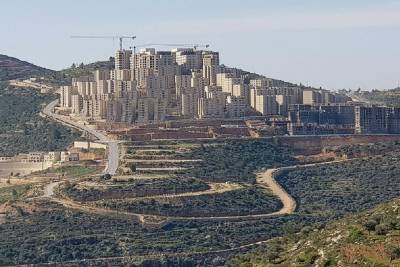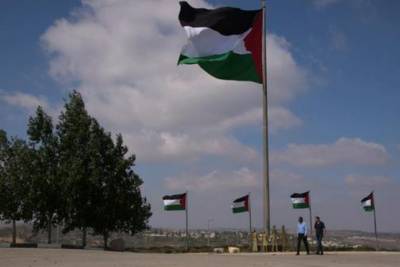Building hope in the West Bank
Des Moines Register - Joseph Jones and Emily Burke - A group of seven of us traveled to the Middle East in December to meet with political, business and community leaders in the Palestinian Territories, Israel and Jordan.
Our time in the West Bank began in East Jerusalem and included meetings in Ramallah, Hebron, Taybeh, Bethlehem and Rawabi. Visiting Rawabi and hearing the vision for this unique, planned "smart city" inspires us to share this part of our experience.
While we understood that we were visiting a construction site for a city financed by a single multibillion-dollar investor, not even the video presented to us in a small 3D theater could prepare us for the massive scale of this Palestinian utopia covering one of the highest peaks on the West Bank. Although there is a hesitation for foreign investment in Rawabi because of political instability in the Palestinian Territories, we find Rawabi's invitation to young families to "Live, Work and Grow" to be both sincere and strategic.
By the sincerity of this project, we refer to the 5,000 housing units with a future residential capacity of about 40,000, the massive limestone walls of shopping centers and office buildings —the landscaped parks, where trees and flowers were already growing, and a sprawling stadium designed to look like the coliseum in Rome.
By strategic, we refer to the tremendous message that a well-developed, well-invested city would send the Israeli government and its allies. During our visit, the question about water was the central topic shared by Rawabi's organizers; the issue is somewhat resolved and undoubtedly is a result of intense lobbying and political maneuvering.
Rawabi offers opportunity to young entrepreneurs and their families in the form of affordable housing and access to the technology that is required to be competitive in the world market. The strategic recruitment and retention of bright risk-takers helps to shore up an active and invested community. There exists a strong appeal for those who left to study abroad to return home to work and raise their families — a push familiar in so many communities across the globe. Rawabi's potential for economic growth would necessarily extend well beyond the West Bank and would focus on products and services that did not require transport — the airport on this side closed years ago.
ndeed, the Palestinian economy has room to grow. The businesses there would benefit from technical assistance and an influx of workers with all levels of skill to create a more favorable business environment. The current economic situation prevents a sustainable positive forecast because of the lack of ports and airports, limiting the importation of parts and materials. The same holds true for those companies that produce goods; they often have difficulty accessing foreign markets.
Before we left the U.S., an Israeli diplomat told us that we should come home with an opinion. He did not advocate for two states or one; for Likud or a political party more to its left. He just wanted us to recognize the relevance of the region and the world's interconnectivity to its struggles.
Elections have since concluded in Israel and knowing the government will remain mostly unchanged, our opinion is that there is hope. In Israel and the Palestinian Territories, the people we met hope for a sincere dialogue between the two sides to replace the endless debate over whose idea is "right." Additionally, poverty, scarcity of water and lack of natural resources can be incubators for extremism.
Rawabi is a symbol of those hopes and an inspiration to not only Palestinians, but to all those who visit and adopt their vision of the future — one where the people can control their own destiny and economy and they can thrive.
In this small space we cannot address all of the intricacies and complexities that exist as hurdles to the issues in the region. Admittedly the Palestinian Authority should recognize Israel's right to exist, just as they want to be recognized by Israel and the rest of the world; and the Palestinians have to address their relationship with Hamas, but there exists hope that this, too, can happen.
To view original article, Click Here.



